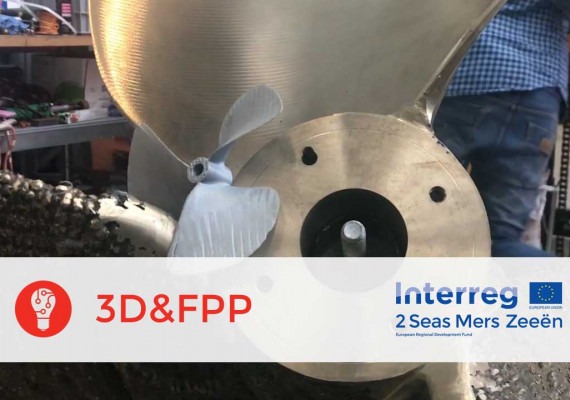3D&FPP
Integrating metal 3D printing and flexible post processing
Priority Axis
Technological and Social InnovationSpecific objective
Technological Innovation
Lead partner
Stichting Hogeschool Rotterdam (HR)Contact
Start Date
01/09/2016End Date
31/12/2019Project budget
2 928 113 €ERDF amount
1 632 765 €ERDF rate
56%About
Common challenge
3D&FPP project partners started from the realisation that the 2 Seas area was performing weakly in terms of innovation, especially in high-tech industries. R&D expenditure was below 1%, which qualified the regions as ‘innovation followers’. However, there are several key players and clusters focusing on the process of Additive Manufacturing (AM), particularly on the printing of polymers and plastics. Additive Manufacturing is the process of joining materials to make objects from 3D model data, usually layer upon layer, as opposed to subtractive manufacturing methodologies.
A major challenge for the industry was to move the emergent technology forward from its prototyping history into a true manufacturing capability. The process had the potential to revolutionise design, production and supply of parts. However, exploitation was limited, especially for the AM of metal parts. This was because the post processing of AM manufactured parts was too costly in terms of time and energy. 3D&FPP rose to this challenge through the integration of the 3D metal printing techniques applied to post processing tools in order to bring about a competitive approach.
Overall objective
Main outputs
Cross border approach
Main Achievements
In 2017 the research conducted resulted in the definition of the state-of-the-art of different post processing steps and the requirements for integration of post processing. Based on the results in 2017, the focus in 2018 was on the development of the post processing solution. After finishing its design, the integration of post processing and 3d metal printing proved to be an IT and interfacing challenge. Each process step has its own unique requirements, in which data integration of CAD, CAM, scanning and CNC milling was key in creating a flexible post processing procedure. An algorithm was developed, generating a specific machine code known as the NC-post. Through this algorithm the CAM NC-code was adjusted by considering the optimal fit and its scanned orientation, resulting in the specific NC post which allows to directly mill the clamped object to its net shape. This algorithm is a universal and flexible post processing solution, fitting most existing CNC machines.
In 2018 the partnership successfully presented the project and results during the RapidPro and Prototype fair, resulting in a broader outreach and the publication of two extra user cases. The application of the Fast Prototyping Approach required an adaptation of the project workplan.
In 2019 the 3D&FPP project ended by presenting the results of their research into integrating 3D metal printing and flexible post-processing. The preliminary demonstration setup was presented during the Future Flux Festival and the setup of the proof of principle and demonstration of the Flexible Post Processing Solution during the 3D&FPP Demo Event on September 19th, 2019. After presentations of the project activities and the research were conducted, a live demonstration was given on the flexible post processing solution, addressing both the advantages and benefits of the solution.
The partnership delivered one integrative report containing all information on the project, the Flexible Post Process (FPP), the conclusions of the demos (including proofs of principle and demonstrated user cases) and the achieved results in terms of time, costs reduction and possible applications and & recommendations for future developments.
Testimonial
By working cross-border, we tapped into the innovative potential of AM clusters in UK, NL and B and developed a process for post processing of 3D printed metals to be used by the high precision industry (semi-con), and by other sectors in the maritime, aviation, automotive and cleantech industries. Each partner provided unique expertise vital to research as a whole and brought along their contacts and networks.


